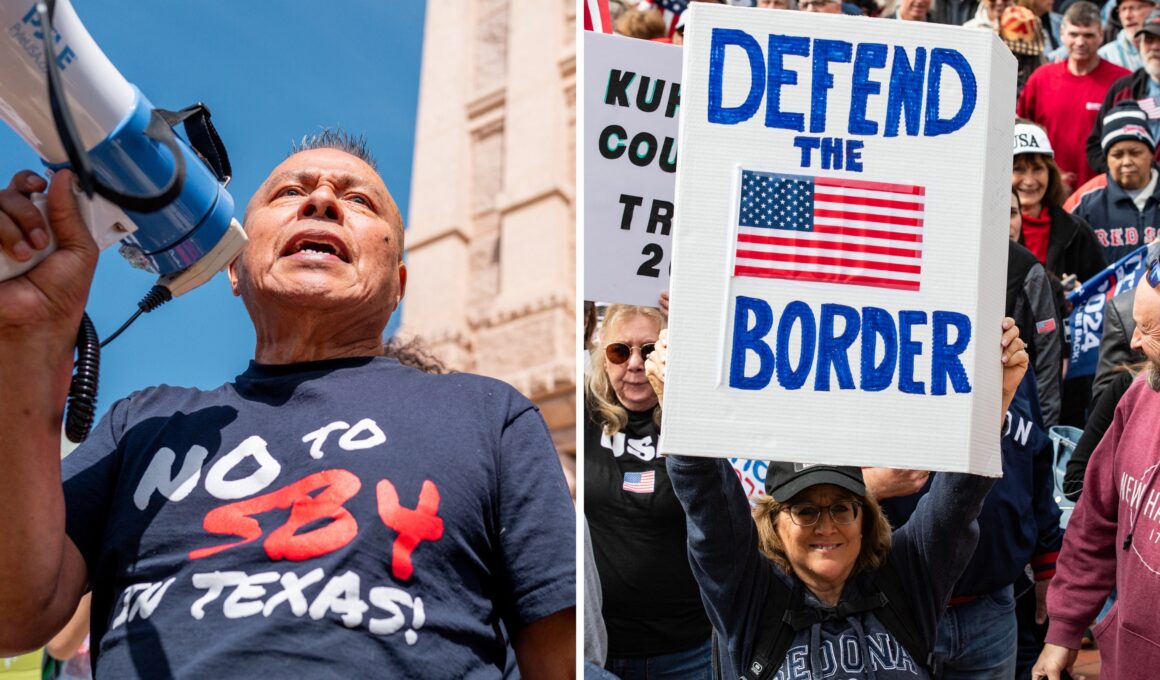Attempts by some Republican-led states to take control of arresting and deporting illegal immigrants could lead to the Supreme Court eventually overturning 150 years of federal immigration authority.
Texas and Oklahoma are among the states that have tried to implement their own immigration laws in recent years, with state lawmakers claiming they have no choice because of federal government inaction on the border. So far, most of those attempts have been halted by lower courts, on the grounds that immigration enforcement is the exclusive purview of the feds.
Tom Jawetz, an immigration advocate who worked with the U.S. Department of Homeland Security and advised the Biden administration on immigration policy, told Newsweek that a growing number of challenges to that precedent could mean the Supreme Court, with its 6-3 conservative majority, may decide to step in.
“It is mind boggling to me, not only that states would assert the independent authority to remove people from the country, but, through legislation, prohibit state judges from halting those prosecutions and removals, based on the fact that the federal government is actively in the process of figuring out whether the person can legally be removed at all,” Jawetz said.
“It just that shows such a disregard for federal authority in this area, to me that was an area that needed to be called out more than anything.”
State-based immigration laws have been blocked
In late June, a federal judge blocked a law in Oklahoma that would make it a crime to be in the state without legal status.
In his decision, Judge Bernard M. Jones referred to a case in Arizona in 2012, in which the Supreme Court struck down a law that attempted to supplement federal immigration enforcement with state measures, on the grounds it was unconstitutional.
At the time, the Supreme Court was roughly split along ideological lines. The justices determined that Arizona’s attempts to create state-level offenses for illegal immigrants, while also making it harder for them to work, defied federal authority in the area of immigration.
Jawetz, now a senior fellow for Immigration Policy at American Progress, said that other states have been testing the limits of the Arizona ruling in recent years.
“Texas was offering an interpretation of statute that would have been extremely restrictive of federal authority and would have essentially commandeered immigration enforcement and given the government of Mexico more power over immigration enforcement than the government of the United States has,” Jawetz said. “And the Supreme Court said ‘that’s crazy!’

“In a later case that came out in 2023, Texas again tried to block the Secretary of Homeland Security from establishing Immigration Enforcement priorities, and this group [the current Supreme Court] said that’s absolutely not your job,” he added.
In the Oklahoma case, Judge Jones ruled last month that state leaders might be frustrated over immigration policies from the federal government, but again said it was not their place to act on those frustrations.
Oklahoma Attorney General Gentner Drummond appealed the decision, arguing that the law was narrowly designed to target “illegal marijuana farms”.
“The Biden Administration’s complete and utter failure to address the border crisis has given Oklahoma no option but to take steps necessary to ensure public safety,” Drummond said in a press release, calling the state law “a powerful tool to counter criminal activity largely being fueled by illegal immigrants coming to our state.”
Jawetz told Newsweek that if states do keep coming up against the wall of previous decisions, then it may cause them to reconsider if the fight is worth it.
While attempts to pass immigration legislation in states like Texas and Oklahoma remain blocked by lower courts, in the latter’s case the judge said that if the Supreme Court were to issue different guidance, then he would listen.
The question is whether the current Court, which leans heavily conservative, would be willing to overturn so much precedent on the issue of immigration. Jawetz said it was not impossible, given other major precedent-defying decisions in recent years, such as the Dobbs ruling that overturned Roe v. Wade.
Very few of the justice who were on the Court for the 2012 Arizona ruling, still sit on the bench today.
Jawetz said that if immigration policy was handed to the states, it would create havoc, from how different states would manage deportations to foreign diplomacy.
“Mexico is our neighbor. Mexico’s our largest trading partner,” he said. “A provocation in one area leads to complications across the board.”

Some of the challenges to state-based immigration legislation have come from the U.S. Department of Justice, seeking to assert federal supremacy.
Others have come from immigration advocacy groups, like the American Civil Liberties Union, which have raised concerns about mixed-status families being separated, even if an undocumented person was working their way through the immigration system.
A change at the federal level, coming from the Supreme Court, could put a stop to all of these fights.
This year, facing growing calls for action in an election year in which immigration has been regularly ranked among the top issues for voters, the Biden administration attempted to enact legislation that would have, among other things, increased funding for border security.
But the federal immigration system as a whole has not seen comprehensive reform in decades, leading to long wait times for visas and citizenships, along with a stretched border patrol.
“When we react to very bad proposals from the other side, it looks like we’re defending the status quo,” Jawetz added, saying people have been trying to reform the system for years to no avail.
“No one is satisfied with the status quo or believes the immigration system works effectively and well for the American public, American families, American business, American economy, and America’s future.”
Do you have a story Newsweek should be covering? Do you have any questions about this story? Contact LiveNews@newsweek.com
Uncommon Knowledge
Newsweek is committed to challenging conventional wisdom and finding connections in the search for common ground.
Newsweek is committed to challenging conventional wisdom and finding connections in the search for common ground.







